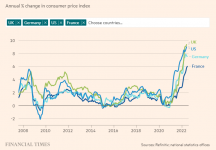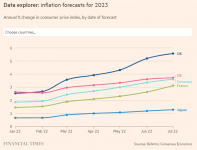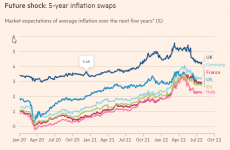In 2025, with Romania having the highest inflation rate of the European Union and France the lowest one.

www.statista.com
We're pretty much bang on the average for the EU (9.4% UK vs 9.6% EU) and lower than 17/27 EU countries.
France is the big outlier and that is because they have capped their energy bills much lower than we have. If we had done the same then we'd also have much lower inflation. We can do the same but we have chosen not to. That is a Tory issue, not a Brexit one. If we were still in the EU we would still have high inflation. It's pretty much all driven by Petrol and Energy and there are things we could do to reduce inflation in those areas if the government wanted to.
Brexit might be contributing but it isn't the cause of high inflation and being in the EU wouldn't have resulted in no inflation.
France owns a lot more of their energy production (electric at least), and they are largely self reliant, they planned for this problem decades before it became a problem, good for them.
This probably explains why they're lower than most on energy costs and it's helped keep inflation down. They do use a lot of nuclear though, which is quite expensive per kWh for the lifecycle, so they've paid for that insurance in years gone by through tax and the like. They did build it cheap though, again good on them. They also largely don't need to cap it, as they own it, so they can adjust as they see fit, and be more flexible. But if they're selling less than their import cost (like for gas), then again, that's coming from tax/ subsidies.
It's funny how a lot of the hard right slag off France, yet they seem to get a lot right in the long run. They also did the same with high speed rail, again good for them.
We have far, far less control than France, as we don't produce our own electric, it's largely reliant on the gas, which we can't cap, as we don't own it. Buying out energy suppliers would be madness, and not solve this problem, as they buy it from the producers which we can't control.
The first 5% of inflation is seemingly very hard to stop (Covid/ War), but the rest is of our own doing, through many decades of bad decisions, no forward thinking and Brexit (backwards thinking).
Had we still been in the EU we would have probably been signing up for reducing energy use, which would lower demand, lower prices and then lower inflation. Hard for us to do this though, as it comes at a cost of growth, and we can't afford to do that as we've just shot our growth in the foot with Brexit. We've took away our options, and because we were already on the path to being screwed after Brexit and pre Covid/ war it means we have a lot less tools at our disposal. Brexit effectively becomes an amplifier.
Capping energy costs or making payments across the board is a blunt tool, which ends up favouring the most well off more than the least well off, similar to tax cuts. This is what the Tories will do, albeit the payments will be low.
To truly benefit those who need it most we should be subsidising energy on a scale from 100% to 0%, from those who need it down to those who don't, a lesser alternative would be increasing the tax free allowance/ benefits. One of these is what Labour should be proposing in an ideal world, but god knows how that would sit with our moron voters, not well I expect.
The whole energy sector relies a lot on the labour market too, especially in construction and maintenance and if you screw that market then costs go up, which further drives inflation. For the same sector materials and time (which is a massive cost) also went up with Brexit and Covid, those are driving up the standing charges and distribution costs, which is also driving inflation too.





